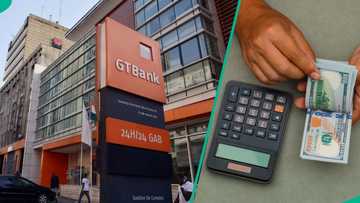CBN Sells $50m to Access, Zenith, UBA, Other Authorised Dealers as USD Demand Surges, Naira Falls
- The Central Bank of Nigeria (CBN) has taken the bull by the horn, intervening in the Nigerian foreign exchange market
- The apex bank sold $50 million to authorised dealers amid pressure on the Nigerian currency, the naira
- In the past week, the naira faced renewed volatility in the exchange rate markets, depreciating for several days
Pascal Oparada is a journalist with Legit.ng, covering technology, energy, stocks, investment, and the economy for over a decade.
The Central Bank of Nigeria has stepped into the currency market again, supplying 50 million dollars to major lenders including Access Bank, Zenith Bank and UBA as demand for dollars intensified across both the official and parallel markets.
The move comes as the naira battles renewed volatility driven by rising demand and softer foreign exchange inflows.

Source: Getty Images
Naira declines across market segments
Market conditions tightened as the dollar strengthened in global markets, supported by improved investor confidence following the reopening of the US government.
This shift added fresh pressure on the naira, which struggled despite the CBN’s weekly supply.
At the official market, the naira slipped by 0.41 percent to close at 1,442.43 per dollar.
The parallel market recorded a deeper fall of 1.49 percent, ending the week at about 1,472 per dollar. Dealers linked the slide to strong demand from importers and individuals seeking dollars for travel, education and business needs.
Analysts say the weakness highlights long-standing structural issues in Nigeria’s FX market.
External reserves show modest improvement
Despite the pressure, Nigeria’s external reserves inched up by 0.18 percent to 43.43 billion dollars from 43.35 billion dollars.
Analysts attributed the growth to steady oil receipts, higher non-oil inflows and a sustained trade surplus. The uptick gives the CBN more room to stabilise the naira in the coming days.
Global oil prices rise on geopolitical tensions
Oil prices climbed after fresh Ukrainian drone attacks on Russia’s Novorossiysk export hub raised concerns about possible supply disruptions.
West Texas Intermediate crude rose to 60.28 dollars per barrel while Brent crude reached 64.54 dollars.
Analysts noted that the escalation is part of Ukraine’s growing campaign targeting Russian energy assets.
Upcoming US sanctions on Rosneft and Lukoil, set to take effect on November 21, are expected to amplify supply risks.
Analysts see near-term stability for Naira
The CBN’s latest intervention is expected to provide some calm as confidence improves gradually.
Analysts at Cowry Asset believe firmer reserves and a more orderly market structure could help the naira trade with a steadier tone in the near term.
Nigeria’s recent Eurobond issuance has also reduced supply concerns and supported stronger market sentiment.

Source: Getty Images
The firm added that a global shift toward risk aversion, which has lifted safe-haven currencies like the yen and Swiss franc, could weaken the US dollar and improve demand for the naira.
FX liquidity, investor confidence expected to improve
Analysts at Cordros Capital maintain a positive view on the naira. They expect better liquidity, rising non-oil exports and stronger investor confidence to drive inflows.
With an improved current account position and supportive global monetary conditions, they believe Nigeria could attract more foreign investment.
While risks remain, analysts say stronger reserves, steady inflows and a weaker global dollar could give the naira some breathing space in the short term.
Naira recovers after days of depreciation
Legit.ng earlier reported that Nigeria’s currency regained ground on Thursday, November 13, 2025, rising to N1441 per dollar across both the official and parallel markets.
The turnaround came after several days of depreciation, offering a rare breather for businesses and individuals grappling with currency volatility.
The improvement followed steady inflows into the country’s external reserves.
Source: Legit.ng




